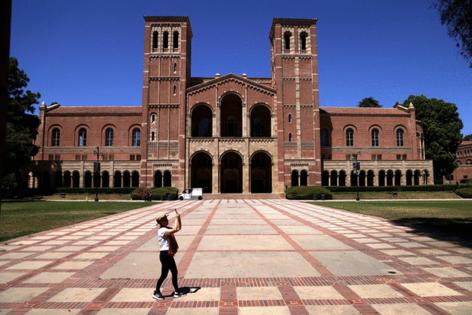University of California must publicly release Trump administration's $1.2 billion settlement proposal
Published in Political News
LOS ANGELES — UCLA must release the Trump administration document that outlines the terms of the $1.2 billion settlement proposal at the center of talks between the University of California and the federal government, the California Supreme Court ruled Friday.
The decision is a win for UCLA faculty who have pushed for more transparency in the negotiations over the future of the nation’s premier public university system. UC has until the end of the day to disclose the 28 pages of federal demands for far-reaching policy changes at UCLA that are in line with President Trump’s vision for higher education.
UCLA asked the high court to take two actions: block a lower court’s ruling that ordered UC to turn over the document to faculty and force the appeals court that declined to review the lower court decision to release a detailed explanation of its reasoning.
“The petition for review and applications for stay are denied,” said brief Supreme Court decision, signed by Chief Justice Patricia Guerrero. The court did not elaborate on the matter.
The proposal will be shared with the UCLA Faculty Association, an independent campus group which sued UC. Faculty leaders have said they intend to distribute the document publicly.
“We’re excited that the Supreme Court agreed with us that every Californian has a right to see this letter and understand the scope of federal interference into our state institutions,” said Anna Markowitz, president of the UCLA Faculty Assn. and an associate professor in UCLA’s School of Education and Information Studies.
UC did not immediately respond to a request for comment.
What’s at stake for each side
UC said in court filings that it would “suffer irreparable harm” to negotiations with the Trump administration if the document became public. It also said disclosure would hurt future settlement negotiations with other parties.
University lawyers argued that releasing the proposal would invite “every member of the entire public to express each one’s views on every settlement” for an “uncontrollable public fray” around negotiations.
The UCLA Faculty Association said that the document’s disclosure is required under the Public Records Act. The association argued that the information is a matter of public interest to faculty, staff, students, UCLA Health patients and Californian’s whose tax dollars support the UC system.
Faculty sued after UC and UCLA denied public records requests. UC said it was not bound by public records law to share details of confidential settlement discussions.
“The intense public reaction to disclosure at an early stage of an initial proposal could easily end any opportunity for discussion at its inception and hamper the ability to fully and fairly evaluate a response,” UC wrote a court filings.
A lower court’s Oct. 14 ruling ordered UC to release the proposal to the association within 10 days. On Wednesday, an appeals court declined to reverse the decision before UC sought emergency relief from the state’s highest court.
The Trump administration sent the more than 7,000-word settlement proposal in August, after the Department of Justice accused UCLA of violating the law in its handling of antisemitism complaints, admissions practices and gender identity on campus. Citing those alleged violations, the federal government suspended $584 million in medical, science and energy research funding to UCLA. The vast majority of the funds are now restored as the result of the a lawsuit filed by UC-wide faculty.
UCLA has maintained that its policies comply with state and federal laws. Its chancellor, Julio Frenk, has said the “far-reaching penalty of defunding life-saving research does nothing to address any alleged discrimination.”
What’s in the document
The Times reviewed the settlement proposal and, in September, published a detailed account of its demands.
They include proposed changes to admissions to prevent alleged affirmative action, stricter protest rules and a ban on gender-affirming healthcare for minors at UCLA medical facilities.
The document calls for UCLA to publicly announce that it does not recognize transgender people’s gender identities, prevent the admission of “anti-Western” international students and to pay the costs for an outside monitor to oversee the agreement.
The offer also says that “the United States and its consultants and agents will have full and direct access to all UCLA staff, employees, facilities, documents, and data related to the agreement, in coordination with legal counsel for UCLA, except any documents or data protected by work product or the attorney-client privilege.”
UC President James B. Milliken has said the fine — a $1-billion payment to the government and a $172 million claims fund for people who say they faced discrimination — would be near impossible to pay.
He has been less detailed on the other federal demands, leading to faculty complaints over how UC has handled negotiations and communicated updates to employees. Milliken has broadly said that UC will protect academic freedom as well as its mission and values in any potential Trump agreement.
_____
©2025 Los Angeles Times. Visit at latimes.com. Distributed by Tribune Content Agency, LLC.
























































Comments